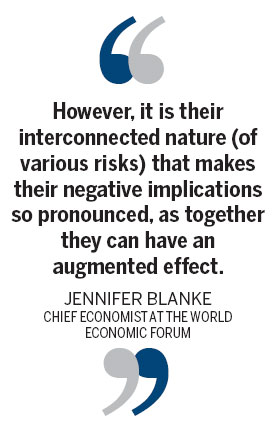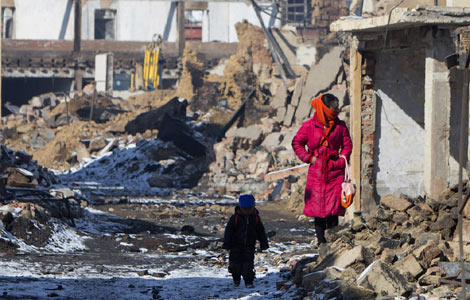Plenty of potential for crises
Updated: 2014-01-17 09:28
By Fu Jing (China Daily Europe)
|
|||||||||||
|
Concerns about fiscal crises persist, fueled by high levels of debt in the US and Japan, the Global Risks 2014 report says. Provided to China Daily |
World economic forum's global risks report warns that worse may be yet to come
The high level of public debt in the United States, the eurozone and Japan top the list of risks that will have the biggest impact this year and severely affect the stability of the global economy.
The World Economic Forum has sounded the alarm bell in its annual Global Risks Report before its annual meeting in Davos, Switzerland, on Jan 22-25, more than five years after the collapse of Lehman Brothers in the US and the beginning of the debt crisis in Europe.
The forum warns that concerns about fiscal crises persist despite the efforts of many eurozone countries to control their debt levels, and with some economies even emerging from double-dip recessions last year.
The concern is fueled by the high levels of public debt in Japan and the US, where political gridlock has worsened perceptions, according to the report, to which more than 700 global experts have contributed. Between 2007 and 2010, the forum listed the collapse of property prices as the biggest risk in terms of impact on the world economy.
In 2011, the biggest impact risk was fiscal crises, while in 2012 and 2013, it highlighted financial failure.
"Fiscal crises can severely affect the stability of the global economy," the report says, noting this as the highest concern out of 31 global risks.
This economic risk is followed by two environmental ones - climate change and water shortage - then unemployment and underemployment, and fifth, critical information-infrastructure breakdown, a technological risk.
"Each risk considered in this report holds the potential for failure on a global scale. However, it is their interconnected nature that makes their negative implications so pronounced, as together they can have an augmented effect," says Jennifer Blanke, chief economist at the World Economic Forum.
"It is vitally important that stakeholders work together to address and adapt to the presence of global risks in our world today."
Advanced economies remain in danger of fiscal crises as investors may at some point conclude that debt levels are unsustainable, given that the US' official public debt is more than 100 percent of its GDP, and Japan's more than 230 percent.

In the short term, the risks are higher for eurozone countries, which do not have the option of devaluing their currencies to make the necessary fiscal adjustment. The forum says many emerging markets, although ostensibly in a better position, have seen credit bubbles in recent years that could turn into financial crises, and then fiscal crises. The rapid credit growth in Asia since 2008 is an example.
The forum says unsustainable debt ultimately forces governments to undertake painful fiscal adjustments by cutting spending and/or raising taxes. If such austerity is not timed well, it can trigger a deep recession and a strong increase in unemployment, a dynamic that has played out in many advanced economies since the financial crisis of 2008.
Finding ways to deal effectively with the current risks of fiscal crises is, therefore, important, the forum risk report says. Without detailing its policy recommendations, it says making fiscal frameworks more resilient is even more important given the substantial long-term fiscal challenges created by an ageing population.
The chronic gap between the incomes of the richest and poorest people is also seen as a risk most likely to cause serious damage globally in the coming decade.
The Global Risks 2014 report includes special investigations in three areas: the increasing risk of "cybergeddon" in the online world, which may further increase distrust; the increasing complexity of geopolitical risk as the world moves to a multipolar distribution of power and influence; and youth unemployment and underemployment.
In particular, the report considers the twin challenges facing those coming of age in the current decade of reduced employment opportunity and the rising cost of education, and considers the impact on political and social stability as well as economic development.
With more than half of young people in some developed markets now looking for work, and rising informal employment (unofficial, casual and part-time work) in developing regions where 90 percent of the world's youth live, the report offers insights into how technological and other measures can be deployed to mitigate some of this risk.
David Cole, group chief risk officer of global reinsurance company Swiss Re, says: "Many young people today face an uphill battle. As a result of the financial crisis and globalization, the younger generation in the mature markets struggle with ever fewer job opportunities and the need to support an ageing population."
Cole says that while in the emerging markets there are more jobs to be had, the workforce does not yet possess the broad-based skills necessary to satisfy demand.
"It's vital we sit down with young people now and begin planning solutions aimed at creating fit-for-purpose educational systems, functional job markets, efficient skills exchanges and the sustainable future we all depend on," Cole says.
The report also warns that the recent revelations on government surveillance have reduced the international community's willingness to work together to build governance models to address this weakness.
The effect could be a "cybergeddon" for the Internet, where hackers enjoy overwhelming superiority and massive disruption is commonplace.
"Trust in the Internet is declining as a result of data misuse, hacking and privacy intrusion," says Axel Lehmann, chief risk officer at Zurich Insurance Group.
"A fragmentation of the Internet itself is the wrong way to solve this issue, as it would destroy the benefits the Web provides to all of us. Rather than building walled gardens, it is time to act by setting up security standards and regaining trust."
Today's multi-polar world presents four key threats that could each affect global stability in the next five to 10 years, the report says. These are emerging market uncertainties, the commercial and political frictions between countries, proliferation of low-level conflict and slow progress on global challenges and governance.
Klaus Schwab, founder and executive chairman of the World Economic Forum, says this year's risks report is a stimulus for reflection by policymakers, chief executive officers, senior executives and thought leaders around the world. It is also a call to action to improve international efforts at coordination and collaboration, going beyond the traditional roles and responsibilities of the public and private sectors to equip institutions to understand and manage the global risks.
"Moving from urgency-driven risk management to more collaborative efforts to strengthen risk resilience would benefit global society," Schwab says. "Together, leaders from business, government and civil society have the foresight and collaborative spirit to shape our global future."
(China Daily European Weekly 01/17/2014 page5)
Today's Top News
Xi writes to Chinese in German colleges
China software to rival Android
Will China dominate the world?
Mainland policy lures HK students
Obama tells Germans he will not wiretap
Party is over for SOEs conferences
Egypt referendum wins support
Home prices continue to climb
Hot Topics
Lunar probe , China growth forecasts, Emission rules get tougher, China seen through 'colored lens', International board,
Editor's Picks

|

|

|

|

|

|






